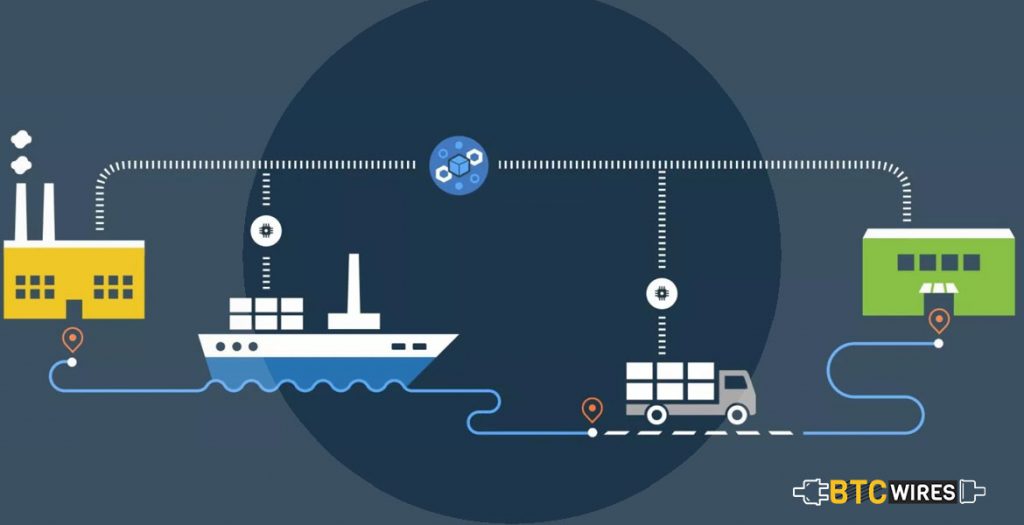Oct 13, 2018 12:30 UTC
| Updated:
Oct 13, 2018 at 12:30 UTC
Blockchain in Supply Chain
Supply chain management incorporates the integrated planning and execution of various processes involving information flow, material flow as well as financial capital flow. The management of the flow of information, goods and services involving the movement and storage of raw materials, building products and full-fledged finished goods from one point to the other is called supply chain management. A supply chain within the SCM is a network of individual entities, businesses, organisations technologies, as well as resources which combine together in the manufacturing of products or services.
Any supply chain advances by initially delivering the raw materials from suppliers to the manufacturers, and eventually ends by delivering the final product to the consumer. A proper implementation of supply chain management can end up in advantages such as enhanced sales and revenue, decreased frauds and overhead costs, with quality improvisation. Furthermore, this will additionally lead to boosting the production as well as distribution.
Whereas everything appears easy in the theory, maintaining a supply chain practically is a time-consuming task even for small businesses. The interconnectivity of various elements in a supply chain slowly becomes more inefficient at the point a business starts to grow. For the purpose of resolving these inefficiencies and save a company’s money, many technologies such as AI and Machine Learning are applied to SCM. Among these, blockchain is discovering new ways to change the entire game.
Challenges in Supply Chain, and Blockchain Solutions

Indeed, blockchain can be applied to several challenges in the world of Supply Chain like tracking of products and complicated record keeping. As a less corruptible and better-automated alternative to centralised databases, following are the approaches in which blockchain can prove to be very useful in the supply chain industry:
Tracking Provenance
Big-sized companies have a lot of elements in their supply chains. Owing to this, it becomes nearly impossible to keep the track of every single record even for multinational corporations. The lack of transparency prompts issues in cost as well as customer relations which ultimately dilutes the brand name.
In a blockchain-based supply chain management, provenance tracking becomes easy as the product information can be reached through the embedded sensors and RFID tags. The product history right from its origination to where it is in the real time can be traced with the help of blockchain technology. Furthermore, such kind of valid provenance tracking can be utilized to detect frauds in any part of supply chain.
Cost Saving
The real-time product tracking in a supply chain using blockchain reduces the overall cost of moving the products in a supply chain. According to a survey led by APQC and the DSCI (Digital Supply Chain Institute), more than 1/3rd of people cited cost reduction as the topmost advantage of blockchain application in supply chain management.
Once blockchain is implemented to boost the administrative processes in supply chains, the additional costs coming in the system are reduced automatically while still ensuring the security of exchanges. The eviction of intermediaries in the supply chain results in saving you from the risks of frauds, product duplicacy and extra costs too. Payments can be processed by customers as well as suppliers within the supply chain by utilizing cryptocurrencies instead of relying on EDI. As a result, efficiency too will be enhanced and the risk of losing products will be reduced with record keeping.
Trust Establishment
Putting trust in supply chain with various participants is essential for smooth operations. For instance, when a manufacturer tends to share his products with suppliers, he/she needs to be able to depend on them for several factors. In addition, whenever it comes to regulatory compliances like custom enforcers, trust plays a significant role. Blockchain’s immutable nature in supply chain is well-developed to hinder tampering and establishing trust.
The Topnotch Advantages of Supply Chain with Blockchain

- Eliminate or reduce errors and frauds
- Improve management
- Decrease the courier costs
- Minimize delays from paperwork
- Quickly identify issues
- Establish trust in consumer and partner
Supply Chain Management with Blockchain

With the ever-growing popularity, blockchain technology appears to be like a solution to the problems of several industries today. Supply chain, as one of the most populated industry, holds certain use cases in which the application of blockchain technology can make a huge difference. A single shipment of goods may have minimum 20 to 25 individuals or organizations involved in the process which roughly leads to 200 interactions between them. Thus, it leads to a lengthy process.
When applied perfectly, blockchain technology can ensure the provenance tracking as well as traceability across the entire supply chain. In turn, this will lead to a few counterfeiters and guaranteed safety in the processes. Blockchain in the supply chain will additionally allow transporters, manufacturers and end-users to collect the data, apply predictive monitoring process and study trends to offer a better product experience. Below are some of the popular use cases of blockchain technology in supply chain –
- Seafood Verification
- Coffee Supply Chain
- Drugs and Pharmaceuticals
- Food Supply Chain
- Automotive Supply Chain
Conclusion!

Blockchain has shown its potential to bring out the positive changes in several industries as well as businesses today including the supply chain industry. Also, supply chain management is considered to be one of the most useful applications of Blockchain technology. Thus, we can expect it to grow by leaps and bounds in the near future. The source of effective operation of a supply chain management is for keeping a transparent, robust, as well as end-to-end communication.
Organizations are discovering new approaches to filter the way their supply chain presently works and adopt the change which blockchain technology comes with. Once the business sees the bigger picture, they will finally go through the hassle of implementing newer systems associated with blockchain to reap the bigger benefits in the future. Dumbing the centralized databases will bring effective change in the form of higher rewards as well as enhanced performance among the supply chain teams.
This can be achieved when the supply chain teams take the notice of the latest technology trends in the blockchain world and find easy ways to adopt the technology in their current systems. The use of blockchain in supply chain management will act as a game changer by eliminating the inefficiencies as well as vulnerabilities of the current system.


























































